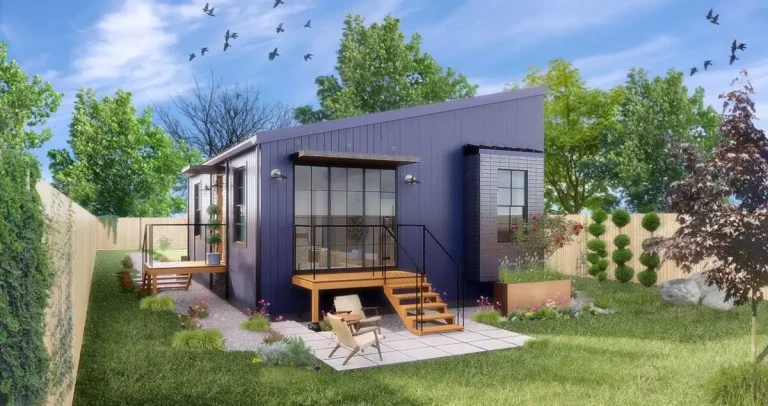The concept of Accessory Dwelling Units (ADUs) has been making waves in the housing market. ADUs, also known as granny flats, in-law units, or backyard cottages, are secondary housing units located on the same property as a primary residence. They offer a flexible housing solution that can be used for a variety of purposes, such as accommodating family members, providing rental income, or serving as a home office.
What Are ADUs?
Before delving into which states allow ADUs, let’s clarify what ADUs are. An Accessory Dwelling Unit (ADU) is a separate, self-contained living space that is attached to, within, or on the same property as a primary dwelling. ADUs come in various forms, including detached structures, converted garages, basement apartments, and even tiny homes. They offer a range of benefits, including increased housing affordability, opportunities for multigenerational living, and additional rental income.
The Legal Landscape
The regulation of ADUs is complex and varies widely depending on federal, state, and local laws. Understanding the legal landscape is crucial for anyone considering building or renting an ADU.
Federal Regulations on ADUs
At the federal level, there are no specific regulations governing ADUs. The rules primarily come from state and local governments, which have the authority to set their own policies regarding ADU construction and use.
Role of States in Regulating ADUs
States play a significant role in shaping ADU regulations. While some states have permissive ADU laws that encourage their construction, others have stricter regulations or even outright bans.
States often use the following criteria to regulate ADUs:
- Location: Some states permit ADUs in all residential areas, while others restrict them to specific zones.
- Size and Design: Regulations may specify the maximum size of ADUs, design guidelines, and architectural compatibility with the primary dwelling.
- Permitting Process: The ease and cost of obtaining permits for ADUs can vary widely from state to state.
Local Zoning and ADU Regulations
Local governments have a say in ADU regulations through zoning codes, building codes, and land use policies. These regulations can vary widely within a state, so it’s essential to understand local requirements before proceeding with an ADU project.
States That Allow ADUs
Now, let’s explore which states permit ADUs and gain insights into their regulatory frameworks.
California
California is one of the most ADU-friendly states in the nation. The state passed legislation in recent years that has significantly streamlined the ADU permitting process and reduced restrictions. California’s laws allow for both attached and detached ADUs.
California’s ADU regulations include:
- Size Limitations: ADUs can be up to 1,200 square feet for detached units and 50% of the primary residence’s size for attached units.
- Parking Requirements: Many local jurisdictions have relaxed parking requirements for ADUs.
- Junior ADUs: California allows the creation of Junior ADUs (JADUs) within existing single-family homes.
Oregon
Oregon has embraced ADUs as a means to increase housing options. The state has passed legislation that encourages ADU construction by removing some of the barriers and providing clear guidelines for homeowners.
Oregon’s ADU regulations include:
- Size Limits: ADUs can be up to 75% of the primary dwelling’s square footage, with a maximum size of 900 square feet for detached units.
- Owner-Occupancy: Some municipalities have lifted owner-occupancy requirements, making it easier to rent out ADUs.
Washington
Washington is another state that has adopted ADUs as a housing solution. The state has progressive laws that allow for ADUs and even includes provisions for detached ADUs in some areas.
Washington’s ADU regulations include:
- Detached ADUs: Washington state law permits detached ADUs in single-family zones.
- Size Limits: Regulations vary by jurisdiction, but in general, detached ADUs can be up to 1,000 square feet or 50% of the primary dwelling’s size.
Massachusetts
Massachusetts permits ADUs, but regulations can vary from city to city. While some municipalities have embraced ADUs, others may have stricter requirements.
Massachusetts ADU regulations include:
- Local Variations: Regulations, including size, occupancy, and parking requirements, can vary significantly between municipalities.
- Special Permits: In some areas, homeowners may need special permits to build an ADU.
Florida
Florida allows ADUs in many areas, but regulations can differ by locality. Some cities and counties in Florida are more ADU-friendly than others.
Florida’s ADU regulations include:
- Local Control: Florida grants local governments authority over ADU regulations, leading to variations in rules.
- Parking Requirements: Some municipalities have relaxed parking requirements for ADUs.
Colorado
Colorado has taken steps to encourage ADUs, but regulations vary. It’s crucial to check with local governments for specific requirements.
Colorado’s ADU regulations include:
- Local Discretion: Cities and counties in Colorado have varying levels of ADU friendliness, with some offering incentives for ADU construction.
Arizona
Arizona allows ADUs but may have varying regulations across different regions of the state.
Arizona’s ADU regulations include:
- Varied Regulations: The rules governing ADUs can differ depending on the municipality.
Texas
Texas permits ADUs, but like many other states, regulations can vary by municipality.
Texas’s ADU regulations include:
- Local Variations: ADU regulations are set at the local level, and they can vary significantly from one jurisdiction to another.
North Carolina
North Carolina allows ADUs, but it’s important to be aware of local zoning regulations that may apply.
North Carolina’s ADU regulations include:
- Zoning Restrictions: While ADUs are generally allowed, local zoning codes may impose specific requirements.
New York
New York permits ADUs, but regulations vary widely between cities and counties.
New York’s ADU regulations include:
- Local Control: ADU regulations are often determined at the local level, leading to variations in rules and requirements.
States with Pending Legislation
It’s worth noting that some states are considering ADU-friendly legislation that may impact future regulations.
States with Restrictions on ADUs
Unfortunately, not all states have embraced ADUs. Some states have strict regulations or outright bans on ADUs. Understanding the challenges in these states is essential for those considering ADU construction.
Case Studies
To provide a better understanding of how ADU regulations work in practice, let’s examine a few case studies of states with progressive ADU policies and their impacts.
Tips for ADU Owners
If you’re considering building or renting an ADU, here are some essential tips to navigate the regulatory landscape and ensure a successful project.
- Consult Local Authorities: Reach out to your local zoning department to understand the specific regulations that apply to your property.
- Work with Experienced Professionals: Hiring architects and builders familiar with ADU regulations can streamline the permitting process.
- Budget for Permitting Costs: Be prepared for permitting fees, which can vary depending on your location.
Future of ADU Regulations
As ADUs continue to gain popularity as a housing solution, it’s essential to keep an eye on evolving regulations and trends in ADU construction and use. Many states are actively considering changes to their ADU regulations to address housing shortages and promote sustainable development.
Conclusion
In conclusion, Accessory Dwelling Units offer a flexible and valuable housing solution for many homeowners and renters. However, the regulations surrounding ADUs can vary significantly from state to state and even within local municipalities. Being informed about your state’s ADU regulations and staying engaged with developments in this housing sector is crucial for anyone considering an ADU project. Whether you live in a state with permissive ADU laws or are working to change regulations in your area, ADUs have the potential to address housing needs and contribute to more diverse and sustainable communities.
Discover the potential benefits of ADUs in your state. Read our comprehensive guide and make informed decisions today!







